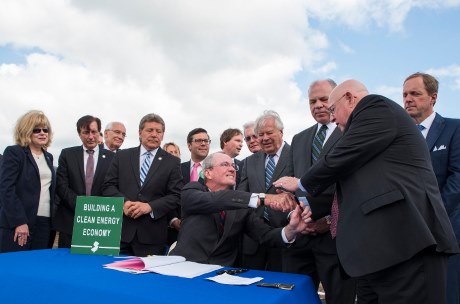New Jersey clean energy laws signed
24 May 2018
Governor Phil Murphy has signed legislation to establish a Zero Emissions Certificate (ZEC) programme that will enable New Jersey's nuclear power plants to continue operating by recognising and compensating them for their carbon-free attributes. The bill was one of several legislative initiatives signed by Murphy yesterday to advance the state's clean energy economy.
 |
| Phil Murphy (seated) at the signing ceremony yesterday (Image: New Jersey Office of the Governor) |
Bill S-2313, which was passed in April by the state's Senate and Assembly, directs the state's Board of Public Utilities (BPU) to issue certificates representing the fuel diversity, air quality, and environmental attributes of electricity generated by eligible nuclear power plants selected to take part in the programme. Nuclear power plants must demonstrate, among other things, that they make a significant contribution to the state's air quality and that they are at risk of closure within three years.
Under the new law, the BPU is able to engage outside experts to analyse financial information and applications from nuclear plants, and to adjust ZEC payments as necessary to meet a plant's actual financial need. A plant seeking to participate in the programme must not be receiving funding from any other federal, regional, or state source that would negate the need for the ZEC.
Four nuclear reactors - the single-unit Hope Creek and twin-unit Salem plants, plus the single-unit Oyster Creek - together generate 38.5% of the New Jersey's electricity. Public Service Enterprise Group, which operates Hope Creek and Salem, has previously said that without intervention the plants would be unable to continue covering their costs within two years and may have to close. Exelon's Oyster Creek, which is already scheduled to close this October following changes to state water use rules that would have required the construction of new cooling towers at the plant, will not be eligible for the ZEC programme.
PJM capacity auction
Regional transmission organisation PJM Interconnection's annual capacity auction, the results of which were published yesterday, produced a price of USD140 per megawatt-day, compared to USD76 for the previous year. The auction procures power supply resources for electricity demand needs three years from now. PJM procured 163,627 megawatts of resources for the period of 1 June 2021 to 31 May 2022. The auction cleared 19,900 MWe of nuclear generation, about 7400 MWe less than last year's auction. PJM is the wholesale electricity market serving all or part of 13 states including New Jersey, plus the District of Columbia.
Alongside the ZEC legislation, Murphy also signed a bill to improve and expand New Jersey's renewable energy programmes, and an executive order directing state agencies to develop an Energy Master Plan providing a path to "100% clean energy" by 2050. The plan is to be delivered by June 2019.
"Today, we're taking another step forward in rebuilding New Jersey's reputation as a leader in the development of clean energy sources while fulfilling a critical promise to foster our state's energy future," Murphy said. "Signing these measures represents a down payment to the people of New Jersey on the clean energy agenda I set forth at the beginning of my administration - a plan that will always consider the best interests of our residents and our environment while growing our economy."
Exelon yesterday commended Murphy for taking a national leadership role in recognising the environmental value of the state's nuclear fleet, advancing other clean energy policies and putting the state on a path to achieve its carbon emissions goals. The package would "help to preserve 90% of New Jersey's carbon-free power, protect 5800 jobs and save residents and businesses USD400 million on their electric bills," the company said.
New Jersey is the fourth US state to pass legislation recognising the carbon-free attributes of nuclear power plants, following New York and Illinois, which have both launched ZEC programmes, and Connecticut, which has passed legislation enabling the Millstone nuclear power plant to enter into a competitive procurement process alongside other zero-carbon energy sources.
"The Salem and Hope Creek nuclear plants play pivotal roles in New Jersey's economy and environment, and Governor Murphy is to be commended for signing this bill into law to help preserve these critical energy assets," Maria Korsnick, president and CEO of the US Nuclear Energy Institute, said. Korsnick urged lawmakers in states where similar measures are under consideration, to take action. "Policymakers in Ohio and Pennsylvania have limited time to act to preserve nuclear plants in their states," she said.
Researched and written
by World Nuclear News